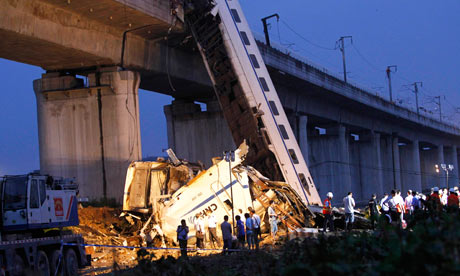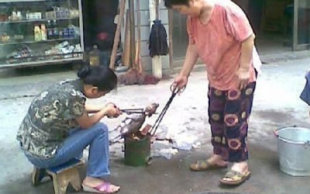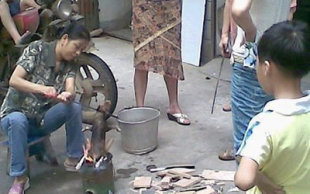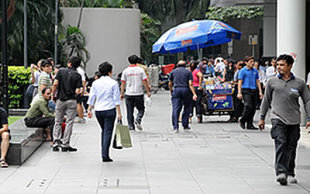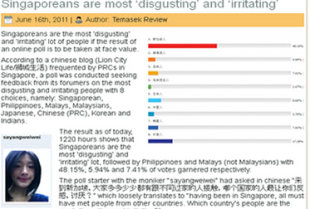April 13, 2011: In a departure from recent history, the powerful
People's Action Party (PAP) has found it hard to recruit talent from the private sector to stand as its election candidates.

This contrasts with the past when it enjoyed widespread popularity with little problem in persuading high achievers from private and public organisations to rally to its banner.
The relative failure comes at a time when opposition parties have made significant gains in attracting quality candidates.
It is posing a setback — at least temporarily — to the PAP's plan to use the election, which is expected next month, to produce the next Prime Minister and Cabinetleaders.
Of the 18 newly-recruited PAP candidates announced, only five hailed from the private sector — an assistant professor, two lawyers and two bankers, one of whom is an executive in the government-controlled DBS Bank.
The remaining 13 — or 72 percent — were top people who had served and resigned from public office to contest under the PAP banner.
They were from the civil service, the army, the statutory boards or PAP-controlled unions. The PAP-controlledNational Trades Union Congress (NTUC) contributed five.
Two army generals gave up their stars to take up politics and are tipped to be core members of the fourth generation Cabinet.
The political leaders have described it as a good, diverse team but it is obvious that the inability to attract private talent weighs heavily on officials' minds.
The paucity was confirmed by Senior Minister Goh Chok Tong who admitted that the PAP had difficulty attracting private-sector high flyers to join efforts to form the PAP leadership team.
Extensive efforts, which included 200 "tea sessions" (interviews) to recruit election candidates from the private sector "have not been that successful," he admitted.
For the PAP, which has not lost a single election in the last 50 years, it is a dismal show especially in the face of a resurging opposition which seems to have less difficulty in this area.
Few analysts are predicting this will be a permanent PAP dilemma or that it will cause the PAP to lose the election, but it may have adverse consequences for the party in future.
Bringing together a diverse team comprising the best candidates is fast becoming an impossible task.
The trouble is that some of the targeted high-flyers either do not support the PAP's current strategy for Singapore or some of its political, economic and social policies.
The potential slate would include successful managers, businessmen, academicians and professionals, people that recruiters have paid special interest to.
How will it affect the future? Firstly, it could erode some of the PAP's support among voters which is already in decline over the mass intake of foreigners.
And, secondly, the reduced number of MPs from the private sector could lower the PAP's performance in Parliament.
"To have too many people with civil service or army background may not be a good idea. Parliament may lose touch with the people," one surfer said.
"What about diversity? Where are the professional social workers, the musicians and poets?" she asked.
The issue, which has become a hot topic, has prompted a National University of Singapore (NUS) undergrad to raise it with PM Lee Hsien Loong during a campus dialogue last week.
How is it, he wanted to know, that despite the high salaries, the PAP had not attracted private talents — but the opposition had.
Lee replied: "I'm not sure whether we're looking for exactly the same people. We're looking for a certain type of person ... (one with) commitment, integrity and purpose."
The preferred people, he added, were already set in their careers and not keen to change tracks or face the high risk of a political life.
Not everyone agrees with his explanation. One commentator said: "The real reason is that many of them refused to join because they disagreed with PAP policies. "They don't want to degrade themselves by having to toe the party line."
The fast expanding social media which alternates between being informative to punishing people it doesn't like, also adds to the reluctance of people to seek election for public office. Many successful people are not prepared to have their private lives or their family members be subjected to critical scrutiny or even insults.
What is putting paid to this is the opposition's apparent success in attracting quality candidates to contest, despite all the arguments about privacy and risks.
By entering politics, an opposition candidate is generally seen as facing a higher risk of defeat or failure and financial losses than the one who stands for the PAP, with its superior resources.
"Yet they are pushing ahead with their principles, unfazed," said an admiring female undergrad — a little too innocently to describe the tough world of politics. Not every politician who fights for the weaker team — or who joins the winning one — does so for a selfless cause.
The reward in Singapore that comes with political success can be very large — for all aspirants.
The high Cabinet salaries, which exceed those of even the richest nations in the world, have attracted top talent to help build Singapore's collective wealth.
But as the public backlash rises, it may be contributing to dissuading successful high flyers from joining the government for fear of becoming a target of criticism and even insults.
In other words, this high pay system may even deter a few potential leaders from joining the political arena.
Related Article:
Opposition: an emerging breed
A former Reuters correspondent and newspaper editor, the writer is now a freelance columnist writing on general trends in Singapore. This post first appeared on his blog, www.littlespeck.com, on 9 April 2011.
*Source: By Elena Torrijos | SingaporeScene



